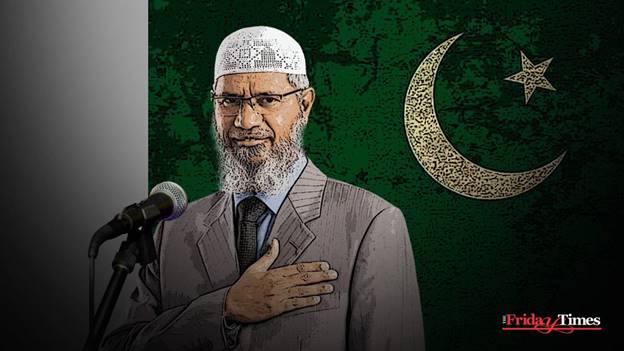
Unfortunately, no traditional Islamic scholar in Pakistan questioned his views in the context of the Qur’an. Their chauvinism was conspicuous in their silence – Image The Friday Times
Zakir Naik's Distortions and Open Challenge to God and His Prophet
By Aslam Abdullah
CA

Dr Zakir is one of the most famous Muslim scholars of this century. He was born on 18 October 1965 in Bombay, India. He attended Kishinchand Chellaram College and studied medicine at the Topiwala National Medical College & BYL Nair Charitable Hospital and later the University of Mumbai, where he obtained a Bachelor of Medicine and Surgery (MBBS).
Inspired by Ahmed Deedat of South Africa, he started working as a missionary, focusing on the comparative study of religions. Millions listened to him and admired his vast knowledge, photographic memory, and public oratory.
He became famous worldwide, and when the present government of Hindu nationalists tried to prosecute him for money laundering, some 14 countries offered him citizenship. He now lives in Malaysia as a state guest.
Recently, he visited Pakistan and made a few comments about the status of women in Islam. People have the freedom to express their opinions. However, they do not have the right to mislead people or attribute things to God, faith, or the Prophet that they never said.
He made the following statements:
- In Islam, a woman cannot rule a nation.
- It is not permissible to shake hands with a woman who is not Mahram for him.
- An unmarried woman is a hooker or street woman.
Let us examine his assertions in the context of the Qur’an.
Queen Bilqees
The Qur’an speaks of the Queen of Sheba, also known as Bilqees. Her story is in surah 27 (Al-Naml): 22–44, and she is presented as a woman of intellect and deep faith.
Did Allah condemn Bilqees for ruling Yemen? But Zakir Naik does.
Touching a woman
On shaking hands with a woman, the learned scholar quoted the following hadith. Ma'qil ibn Yassar (may Allah be pleased with him) said: the Messenger of Allah (peace and blessings of Allah be upon him) said: "For one of you to be stabbed in the head with an iron needle is better for him than that he should touch a woman who is not permissible for him." (Narrated by At-Tabarani ) He confused his audience by presenting it as a hadith in Bukhari.
It is not about shaking hands. It refers to touching a woman with the intent of seeking sexual pleasure. Zakir Naik seems to be obsessed with sexuality. Hence, he regards shaking hands, even with girls in an orphanage, as an act of sexual pleasure.
The Prophet never looked at a woman with a lustful eye. He was always respectful to them. But Zakir Naik seems to view his shaking hand with a minor girl as an act of sexual pleasure.
Unmarried women are hookers
His statement that unmarried women are like hookers crossed all limits of decency. He forgot the story of Maryam, the mother of Jesus. The Qur’an describes Maryam (Mary) as a woman of great devotion, perseverance, and worship and one of the most remarkable women of all time. The Qur’an also describes her as being chosen by the Lord twice, first when Imran heard the glad tidings and then when she became pregnant without a man.
In the words of the Qur’an, marriage does not determine the purity of a woman, but Zakir Naik believes otherwise. God did not describe Maryam as a street woman. The priests in her time did. Naik, in his logic, followed the priests rather than God almighty.
Unfortunately, no traditional Islamic scholar in Pakistan questioned his views in the context of the Qur’an. Their chauvinism was conspicuous in their silence. Zakir Naik's views on women have exposed his real misogynist agenda and convinced me beyond any doubt that he has yet to understand the meaning of the dignity of human beings as described in the Qur’an.
(Dr Aslam Abdullah is a resident scholar at Islamicity.org and editor-in-chief of the Muslim Observer newspaper. He is also the Indian Islamic Heritage Project director of the American Federation of Muslims of Indian origin and the interim President of the World Council of Muslims for Interfaith Relations, WCMIR.)

